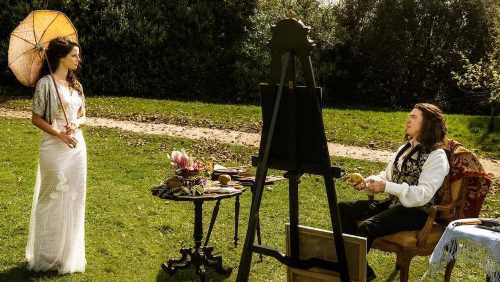In frilly YA frivol “The King’s Daughter,” Louis XIV (an awkwardly bewigged Pierce Brosnan) orders a mermaid captured and brought back to Versailles, so that he might sacrifice the creature during a solar eclipse and attain eternal life, it takes just a few minutes for such an amazing feat to be accomplished. But haste is hardly the order of the day with this quasi-historic fairy tale, which follows that thrilling opening with royal balls and cross-country horseback rides, courtly intrigue and plentiful costume changes — a girly dream of the French monarchy, for which would-be audiences have been obliged to wait a quarter-century.
The well-liked book on which it’s based, Vonda N. McIntyre’s “The Moon and the Sun,” was published in 1997, and discussions began almost immediately about an adaptation. The film focuses largely on what happens after the mermaid reaches France, and the Sun King (played by Brosnan with nary so much as an attempt at a French accent) sends for his illegitimate daughter, Marie-Josèphe (Kaya Scodelario), who identifies with the mermaid and lobbies her father for its release. The rest is told largely from the young woman’s perspective, as she takes a courageous stand — inspiring yet incredible — against her father, and the patriarchy as a whole.
Drawing considerable production value from access to the real Versailles, its Royal Chapel and its gardens, the movie looks (and sounds) just terrific, even as it lurches rather inelegantly in pursuit of the magic the characters so clearly seek. One particularly eye-rolling scene finds Louis the Great painting his daughter’s portrait near Belvedere Pavilion, built far later for Marie Antoinette’s amusement. Others make cleverer use of historic details: Consider the way the film repurposes the famous Marly Machine, invented to pump water from the Seine River to supply the fountains of Versailles, using it instead as a way to transport the mermaid to and from her underground prison.
Production began in 2014, overseen by “Soul Searcher” director Sean McNamara, but the result languished in limbo for eight years before quietly opening earlier this year — so quietly that it wasn’t until “The King’s Daughter” hit home video that its release even registered on our radar. Among the movie’s many mysteries, that explains how William Hurt, who died in March, happens to be looking so healthy as Père Lachaise, the king’s personal confessor — and the loosely reimagined real-life figure for whom the famous Paris cemetery is named.
The film is hardly short on talent. It was co-written by James Schamus, the former Focus exec and “Brokeback Mountain” screenwriter. Rachel Griffiths appears for a fleeting moment, practically all that remains of a subplot about Marie-Josèphe’s past. To fill in such holes, Julie Andrews was brought in to narrate — likely a post-“Bridgerton” decision used to smooth over the final edit. The movie concludes with an original song by Sia, “Alive” (which fans first heard back in 2020), and the unbelievably optimistic line, “The End … is just the beginning.” The final scene, which takes place at Atlantis, suggests enticing new threads that might have been explored in subsequent films.
Thus, “The King’s Daughter” joins a long line of 21st-century YA fantasy one-offs that were intended to spawn franchises but failed to launch — a roster that includes “The Golden Compass,” “Eragon” and the aptly named “The Last Airbender” and “Ender’s Game.” Who’s to say what happened exactly? In what looks like the equivalent of a star being “canceled,” the Sino-American project’s Chinese backers lost faith when Fan Bingbing, who plays the mermaid, found herself at the center of a massive tax scandal.
It would have been easy enough to reshoot her scenes, which are disappointingly thin in their current form. Rendered thus, the CG mermaid’s curiously inexpressive face makes her difficult to identify with. For the story of this misunderstood creature to engage, the way “Splash” or “The Shape of Water” did, she really ought to be a more prominent character, but only Marie-Josèphe can understand her. Meanwhile, among the male cast members, two vaguely villainous young men look rather too much alike to distinguish at times: Sacrificing the mermaid is presented as a scientific folly, suggested by Dr. Labarthe (Pablo Schreiber), while a not-dissimilar dandy named Lintillac (Ben Lloyd-Hughes) angles for Marie-Josèphe’s hand in marriage. Through it all, Père Lachaise takes the young woman’s side, which is curious, considering that McIntyre’s novel had her acting in defiance of the Vatican.
Although it’s only just reaching the screen, “The King’s Daughter” predates the “Versailles” series, but owes an obvious debt to Sofia Coppola’s “Marie Antoinette” in the way it presents the castle as a meeting place of fashionable English-speaking elites. The film is perhaps better suited to young audiences, who will appreciate scenes in which Marie-Josèphe draws inspiration from the mermaid’s song to compose a cantata. Dad has other plans, but she has eyes only for Yves De La Croix (Benjamin Walker), the sea captain who caught the mermaid and now her heart. It was on this film that Scodelario met Walker. The couple are now married, which suggests there’s a “happily ever after” to be found somewhere in this froufrou film maudit.
Source: Read Full Article
